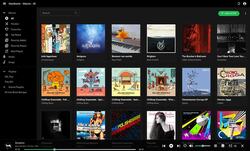Free Software, Package Managers, Paying Maintainers, and More Openwashing/Microsoft PR From the Open Source Initiative
-
5 Best Free Self-Hosted Music Streaming Software
This article shows you the five best music streaming services you can install for free and fully control your music collection.
If you’re a music lover looking for free and open-source music server software to build your own self-hosted live streaming audio server for your extensive music collection, you’ve come to the right place.
Setting up your own music server with media server software is simple. But services like Spotify already offer similar functionality. So, why build your own?
-
Nibble Stew: "Why is it that package managers are unnecessarily hard?" - or are they?
At the moment the top rated post in In the C++ subreddit is Why is it that package managers are unnecessarily hard?. The poster wants to create an application that uses fmt and SDL2. After writing a lengthy and complicated (for the task) build file, installing a package manager, integrating the two and then trying to build their code the end result fails leaving only incomprehensible error messages in its wake.
The poster is understandably frustrated about all this and asks a reasonable question about the state of package management. The obvious follow-up question, then, would be whether they need to be hard. Let's try to answer that by implementing the thing they were trying to do from absolute scratch using Meson. For extra challenge we'll do it on Windows to be entirely sure we are not using any external dependency providers.
-
James Bottomley: Paying Maintainers isn’t a Magic Bullet
Open Source is often portrayed as a “disrupter” of the market, but it’s not often appreciated that a huge part of that disruption is value destruction. Consider one of the older Open Source systems: Linux. As an operating system (when coupled with GNU or other user space software) it competed in the early days with proprietary UNIX. However, it’s impossible to maintain your margin competing against free and the net result was that one by one the existing players were forced out of the market or refocussed on other offerings and now, other than for historical or niche markets, there’s really no proprietary UNIX maker left … essentially the value contained within the OS market was destroyed. This value destruction effect was exploited brilliantly by Google with Android: to enter and disrupt an existing lucrative smart phone market, created and owned by Apple, with a free OS based on Open Source successfully created a load of undercutting handset manufacturers eager to be cheaper than Apple who went on to carve out an 80% market share. Here, the value isn’t completely destroyed, but it has significantly reduced (smart phones going from a huge margin business to a medium to low margin one).
All of this value destruction is achieved by the free (as in beer) effect of open source: the innovator who uses it doesn’t have to pay the full economic cost for developing everything from scratch, they just have to pay the innovation expense of adapting it (such adaptation being made far easier by access to the source code). This effect is also the reason why Microsoft and other companies railed about Open Source being a cancer on intellectual property: because it is. However, this view is also the product of rigid and incorrect thinking: by destroying value in existing markets, open source presents far more varied and unique opportunities in newly created ones. The cardinal economic benefit of value destruction is that it lowers the barrier to entry (as Google demonstrated with Android) thus opening the market up to new and varied competition (or turning monopoly markets into competitive ones).
-
Open Source Initiative expands its role to AI and machine learning [Ed: OSI has shifted into a Microsoft front and GPL violations enabler]
As part of this, the OSI is putting more emphasis on its [Microsoft] ClearlyDefined project.

